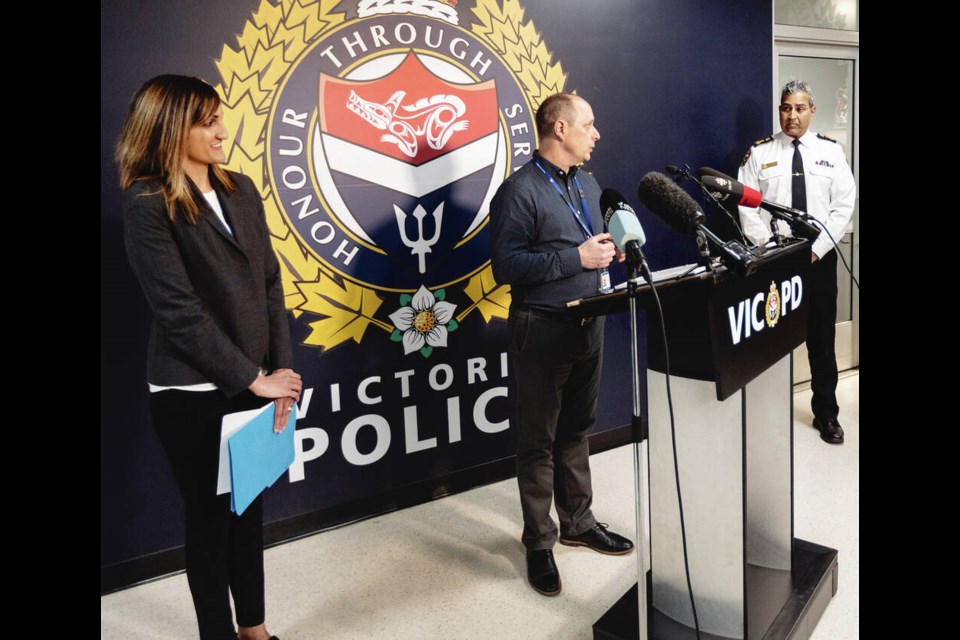At first blush, the question about the latest collaboration between VicPD and Island Health isn’t whether it will work, but whether it will be enough, given the volume of mental-health calls the police field.
They announced it Monday: A new unit in which a plainclothes police officer and a health professional partner in an unmarked car, responding to crises traditionally handled by uniformed cops.
The Co-Response Team was actually launched two weeks ago and has already had success, Police Chief Del Manak told a Monday news conference. He used the example of a call about a guy acting strangely, an incident the mental-health professional was able to resolve simply by helping the man refill a prescription over the phone.
“Had this been a police-only response, the person would most likely have been transported to the hospital because our officer would not have had the expertise to ask those probing questions and to come up with a solution other than to apprehend him under the Mental Health Act,” Manak said.
The Co-Response Team model is not new. Similar teams have been used for years in other places around B.C., including Nanaimo in recent times. It works well, supporters say, and fits the belief that police shouldn’t be taking the lead on calls that are primarily about mental health.
When the unit shows up, the specially trained officer’s role is largely to keep everybody safe while the mental-health worker does mental-health worker things. Together, they de-escalate things.
Late last year, Premier David Eby announced $3 million for more cop-clinician partnerships around the province.
That’s great as far as it goes, but will it go far enough? Note that the Co-Response Team only consists of two, two-person teams, spelling each other off while providing service from 8 a.m. to 8 p.m., seven days a week.
Mental-health crises happen at night, too. Also, the unit covers only VicPD territory, Victoria and Esquimalt, not the rest of the community.
There is a police officer attached to a separate initiative, Island Health’s Integrated Mobile Crisis Response Team, that covers the entire south Island, but it performs a different role. Its members, who are on duty from 1 p.m. to midnight, sometimes respond to crisis-line calls in person, but are only accompanied by the officer if there’s a concern about safety.
Island Health also oversees four multi-disciplinary Assertive Community Treatment teams — psychiatric nurses, addiction-recovery workers, registered nurses, social workers, and so on — who take an integrated approach to treating well over 300 people whose severe mental illness is often compounded by substance abuse.
The teams don’t respond to 911 calls, but do call on their clients to provide medical care, psychiatric help, access to housing and help managing medication and money.
VicPD officers have long been attached to the ACT teams, something that rankles those who believe police presence in such units stigmatize mental illness and links it to criminality. Note that a local mental-health response team is being formed that will have no police involvement.
ACT team members themselves, though, have argued that while very few of their interactions with clients require police, some definitely do. “It’s frighteningly naïve for the general public to think that it’s appropriate to defund and remove police from a team such as ours,” is the way one of them put it in 2020.
When Esquimalt council later balked at a budget package that included continuing to fund a pilot project that had increased the number of police attached to the ACT teams from one officer to three, some non-cops on the teams stepped forward to say scaling back the number of officers jeopardized their safety and their ability to help certain clients.
There are some buildings that workers don’t want to enter alone, they said, some situations too volatile to enter unprotected.
The provincial government has since ordered the restoration of funding for the second and third ACT officers, though the posts have yet to be filled.
The ACT saga illustrated the greyness that can enter the equation, the difference between mental-health crisis and public-safety matters not always being as clear as some believe. That’s what makes the Co-Response Team model, with both police and mental-health professionals responding at the same time, seem so attractive.
The idea is that some calls will see the Co-Response Team car dispatched right away, and that on other occasions, patrol units might be sent first, but then find that the specialized unit would be better suited to the situation.
Sounds great, but will one cop and one nurse in one car covering just two municipalities for 12 hours a day really meet Greater Victoria’s need?
Maybe not, but at least it’s a start, and it’s more than we had two weeks ago.
>>> To comment on this article, write a letter to the editor: [email protected]



